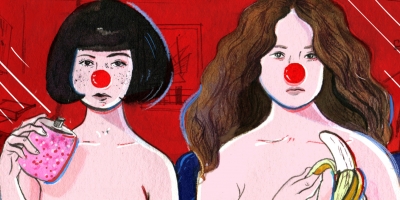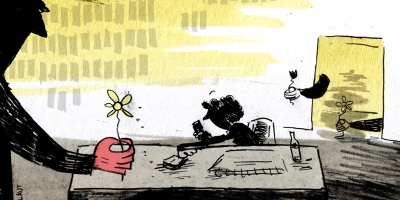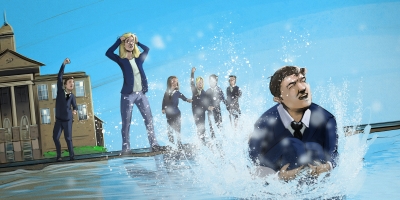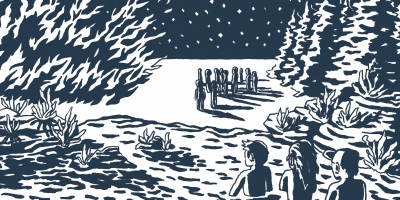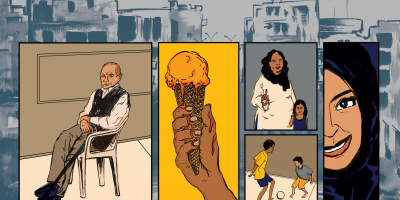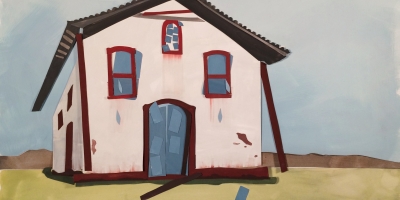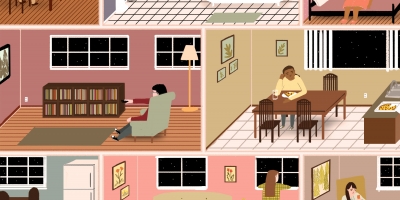Fiction
South Congress
by Bryan Washington

The pretty ones always came looking for pills. Blond and dazzling. Fresh from the Roxy. Glittered dresses and caramel lip gloss, and Raul couldn’t help but drool, just a little, as they slumped through the Corolla’s open passenger window. Avery was suave, or whatever passed for that at forty—all Yes ma’am, and Wouldn’t you know beautiful, and Of course I saved my good shit for you—but it was Raul who blushed when they howled his name, days past drunk, Hoe-la Rah-hool, Did you miss us Rah-hool, Give me a kiss over here Rah-hool, until Avery finally waved them away, twenties folded under his palms, yelling at the kid to keep his eyes on the fucking boulevard.
Raul could usually tell just by the corner they chose. He’d gotten good at that. They’d park on Congress for however long it took, until the pickups cruised under the streetlamps on McKinney—or the bimmers by Rusk, the purple minivans near the community garden—and he’d lean into the backseat for the little black Jansport, sifting through baggies sealed with rubber bands and tape. Everything had a label. Avery’s call. Because everyone, according to Avery, had a type, some nasty little vice, and for the years of Raul’s stewardship he watched those old black fingers point them out.
Kush was all the bums could afford. Spice for the Arabs bussing tables on Gray. The doctors asked for coke and the valets asked for coke and the oil and gas crowd wanted whatever cost the most. E for the housewives, hash for the doormen, and pot for anyone who didn’t know what they were looking for until Avery asked respectfully, demurely, if a little cannabis would do.
Raul didn’t deal in the beginning, or ever. He drove. The roads made no sense but eventually he figured them out. Fannin hooked into Dallas. La Branch sat across from Austin. Streets ran in conjunction, a tangle of dirty shoelaces. It wasn’t long before Avery stopped quarterbacking from the passenger seat, and Raul didn’t mind the silence, he actually sort of welcomed it, until he looked at the figure beside him to find him snoring, dead to the world.
Some nights they just cruised and cruised. Stopping and turning. Breaking before the expressway.
But mostly they had business. A drop here, a sure thing there. They’d wait until the cops packed it in, creeping around the same avenues. Then one evening, early on, Raul blew through a light, and a siren wailed a lone note before the flash went off behind him.
He nearly shit himself. Months and months of riding dirty all over Houston, and here he was: deported for missing a red.
Except Avery woke up. He rolled down his window, called the cop by name—Jeremiah! They done switched you up!—and Officer Jeremiah Stewart blinked, stuttering, before he tightened his belt and cracked his knuckles and hunched over the passenger door like he’d been looking for something himself.
They jawed about football and cousins and brisket. Avery asked about the wife, their garden in the Ward. The cop said something about Avery’s son, and Avery blew right by that with a wave, said the kid was a man now, better off than the both of them. They talked and they talked, and Raul pinched himself, a little drowsy, until the cop nodded his way, asking Avery who that was. And Avery smiled with all of his teeth before he said, My nephew, obviously.
He was still cheesing hours later. A rolling guffaw like an avalanche.
Everybody out here looking, he said, And don’t know when to open their eyes.
Uh-hunh, Raul nodded. Uh-hunh, uh-hunh, uh-hunh.
Avery picked him up after dark. They’d creep along roads Raul’d stepped through earlier, static if not for the street lights, the monorail. So late that no one was walking unless they had to, and the silhouettes between alleys looked like something off the television.
Their supplier was a stocky Greek. Damian Dukakis. Damo to associates. Raul hadn’t known about Greece, couldn’t have found it on a globe with his finger on the Aegean, but standing in Damo’s condo, you’d have thought they’d landed in Athens. Portraits weighed the walls. Butter clogged his nose. Occasionally, a little girl flashed through the kitchen, corralled when an older woman sped around the corner, and Damo’d stop midsentence, snapping his pudgy fingers in Raul’s face.
They’d leave with a week’s supply. Come back the next to distribute Damo’s cut. His yard sat under a bed of trees, an oasis right in the center of town, and Avery’d shake his head on their way out the door, saying Damo’s good people, to Raul, who hadn’t asked.
Family man, said Avery. Got a daughter, an old lady. Been pushing for twenty-two years now and not one fuckup.
Or just one, he said. Small thing. Couple kids came sniffing around. Damo plugged their noses.
Man knows what time it is, said Avery. Most boys out here don’t.
All Raul knew was that most boys looked nothing like them. Most boys slung dope in gas-station parking lots. Most boys slipped half their cut to whatever schmuck took them on. Headphones in their domes, always young and black and mean and smoking. He didn’t know what they saw when they scoped him and Avery, a dirty old man and a spic in a Corolla, but he knew what they couldn’t have guessed—that they were taking in more than a couple grand a night. And from all parties, too: white, brown, red, and yellow.
Desire don’t discriminate, said Avery. Desire’s gonna swallow every motherfucker out here.
So we don’t discriminate neither, said Avery. We’re equal opportunity pharmacists!
Raul’d worked other jobs before, but his English was rough and the city wasn’t waiting on him. He’d ground meat for a Thai diner, strung hangers at a dry cleaner. Twenty-hour days, six days a week. Whatever cash they paid him, if they paid him at all, was just enough for bus fare and maybe a grubby taco. He’d considered whoring himself at one of the clubs set up off of Elgin, but the other guys dissuaded him, bitching about the pay, and when Raul glanced at the clientele, balding white dudes in graying suits, he decided he wasn’t quite desperate enough to let one of them inside of him.
This after nearly a year of sitting in the apartment, a dilapidated piss-yellow complex downtown. Pacing up Alabama, conjugating under his breath. The buildings always impressed him, so tall that in the business district, he’d squint and shut his eyes as if maybe then he’d catch their peaks. The Nigerian vendors behind the complex had come to recognize him, and sometimes he’d slip into their stalls, hearing out their pitches for earrings and DVDs. Raul never bought shit, but he always listened. Their accents were like potholes. The clicking of consonants dulled to a thud. He’d offer a thumbs-up, and they’d offer theirs back.
His mother’d sent him up from Villa Nueva, and his father was who knew where.
He lived with his aunt as a favor to her sister. The aunt worked in a hospital, bucketing crap and blood for years, but eventually the ladder presented itself and now she was some doctor’s secretary. She was grateful to her sister, who’d stayed behind so she could flee, but the years had passed and her brow had furrowed, and eventually she realized she didn’t have to do that. She could admit that she hadn’t much liked her. And she didn’t much like Raul either. He was too dark, always gurgling his words. He spoke too quietly. He never washed the dishes. And no matter how many times or in what tone she used, he always left the seat up, like she was back on the old shift, like she wasn’t doing him and his whore mother a solid.
Eventually Raul found himself on a day crew, after a Mexican with a wrench spotted him drifting up the block. They held eye contact for a few waxy seconds, and the man asked in impeccable English if he was employed. He told Raul to come back tomorrow, crack of dawn, and Raul told his aunt about the encounter that evening, his first strike of luck in weeks and weeks. She told him he must not have opened his mouth.
He showed the next morning. Dirty jeans, white shirt. The man did not. Raul stood among the smoking workers for a while, looking for a conversation to fold himself into, and when it became clear that they either couldn’t or wouldn’t hear him, he asked, not impolitely, about the man he’d spoken to yesterday.
Accident, said another guy, not even looking up from his taco. Faggot fell off a chimney.
Raul was the replacement. Lucky he’d shown up.
What they did was roof houses. Not in the neighborhoods that needed roofing—the ones with more black people than he’d ever seen in his life—but the other ones. The quiet ones. The ones with trees bursting from concrete and children walking in groups, chaperoned by wide women in orange vests and hard hats. At lunch they’d sit and watch the convoy pass. Sometimes a kid waved, and the men would wave back, until the chaperone grabbed the child’s wrists, shooting the workers a look. One of the guys said he could ferry his own sons over if they got their hands on two of the girls, took them back to Honduras, and a few others laughed until someone told him to shut the fuck up.
Raul wasn’t great with a hammer, but he figured that if he eliminated a nail a day he’d at least look like an asset. Maybe. A handful of old hires swung by to check on him, and they’d see the nail, and they’d see Raul. And they didn’t laugh or frown. They shrugged. Squeezed his shoulder.
He spent the rest of that day and a couple more hammering.
It was something to do.
But then morning came the next week, and the group he’d been meeting wasn’t meeting anymore. He loafed around for a while, nodding at everyone else left off the memo. When it was clear that the ship had moved on and that he wouldn’t be paid, he walked back home beside the steady belch of traffic.
They met on a lazy afternoon. Raul’d stepped outside for a cigarette, although really it wasn’t the smoke he needed so much as a break from so many different tongues and the sun lapping at his neck and that crushed feeling he got whenever he shut his eyes. The AC in the apartment had taken the day off. The roaches under the carpet had overtaken the countertop. He was watching a Jehovah’s Witness work her way up the block when the little black Corolla slid into the lot behind her.
That lot belonged to a series of lofts. Glossy and refurbished. Lawn chairs on the balconies. Raul didn’t even look at those buildings, because they made his stomach pop. They made him think of murder. A white boy in sweatpants skipped out of the garage, glancing both ways before he leaned into the Corolla.
Raul watched them talk. He watched the exchange of hands. And then the car peeled off, and the white boy skipped away, like he hadn’t just handed two grand to a stranger. The whole transaction took less than two minutes. The little lady in the shawl hadn’t even crossed the road yet.
A few days later, but not too soon, Raul found himself in the same spot, broad day, smoking. He didn’t have a plan.
It didn’t look like anything would happen, until all of a sudden it did. The Corolla pulled into the lot. The driver’s window drooped, revealing a black man in shades. Grizzled, with a mustache as dark as any Raul’d ever seen.
Can I he-elp you, he said, and Raul just swallowed. He said he didn’t know.
The man looked at Raul’s tattered flip-flops, his unwashed hair. He asked if he was looking for pot.
No, said Raul.
The man asked if he was looking for blow, and Raul told him he wasn’t. The man asked if he was looking for dust, and Raul told him he wasn’t. The man asked if he was looking for X, and Raul told him he wasn’t. The man asked and asked and asked and asked and Raul shook his head, a little dizzier for the effort.
So, said the man. You just popped over to chat.
Raul peeked into the car. He said he was looking for work.
Kids like you get work just about anywhere, said the man, after a while. He asked if Raul worked for Jacob, did he work for Screwtop, or Lacy, or Tom-Tom.
Raul knew what he wanted to say, but he didn’t know how to say it in English.
No, he said.
Then what the fuck, said the man.
Raul swallowed again. He said he was looking for work.
Downtown traffic had begun to wake up. The Nigerians behind them yelled obscenities at passersby, waving purses and blankets and necklaces from Shanghai. A school of shlubby bankers in shorts crossed the road, cell phones at their ears, gophers in motion.
The man just stared and stared at Raul.
Then he sighed. Shook his head. He slipped off his shades, unearthing a pair of tired eyes.
Avery extended his hand. He asked if Raul had a name, or had he left that at home with his sense.
Avery knew all their buyers’ names, and eventually Raul did, too.
They sold to the postman who never wore socks. They sold to the little brown woman in the headdress. They sold to the cabbies and they sold to the line cooks and they sold to the Pakistani gentleman in the robe.
Occasionally they broke a little off for the homeless. Damo shook his head whenever they tried to justify it, but they overcharged the club kids, so he never gave them grief. They’d sit in his living room counting out the profit, and Damo only said he really hoped they were proud of themselves.
Avery told him he had no idea.
It baffled Raul that these people left their houses, left their couches and their kids and their fridges and their televisions. To come out here. These stinking, fucking streets. The filthy heft of Texas Avenue and the sewage clogged on Fannin and the twilight at the end of every godforsaken intersection.
But Raul didn’t ask questions. He didn’t say shit about it.
It’s hubris, said Avery, one day, apropos of nothing. They’d been waiting on a drop for an hour and a half, after the girl swore she’d left the rest of the cash back at her place. She’d been dressed in Peanuts pajamas, clicking through her phone. Avery’d smiled, told her to take as long as she needed, and the moment she peeled off in her jeep he let out a groan.
Raul didn’t know that word. He’d been practicing with Avery whenever business was slow, stuttering through chit-chat until it tasted less like rocks. He asked Avery what it meant.
Don’t worry about it, said Avery. We’ll never have the pleasure.
When business was slow, Avery had stories.
Avery had stories like no one had stories. Stories about coming up in the Ward. Stories about Frankfurt and Rome in the army. Stories about how they booted him for fucking some guy’s wife. Stories about heroin and the story about his first sale and some stories about his kid, college boy now, Christ bless his mother. Raul never learned Avery’s son’s name, he wasn’t privy to that information, but he learned a lot of other things about him.
Avery’s son was an Eagle Scout. Avery’s son could fit in his father’s clothes. The year he turned twelve, Avery’s son came up with a plan to end homelessness, and he’d shared it with Avery and his mother in the kitchen. The year he turned eighteen, Avery’s son crashed his ride, but only because he was worried about the drivers in the next lane. Avery’s son lived less than a couple blocks away, and Avery never saw him, he had no idea what he was up to.
Should be at Texas Southern still, said Avery. ’Bout your age, but cleaner. Less smelly.
Mother’s still in the Ward, said Avery. Just didn’t work with us. You know how that is. Her new thing’s a mechanic. I say she had her a street man, she’s moving down the chain, and she just clicks her tongue at me like duh.
White women, said Avery, they love that shit. A street man. The Arabs, too. Prettiest dish I ever saw was Arab, and it really makes sense, the Bible was full of them. Saw her walking through the airport, stepping out the bathroom. Had the sheet on her head and everything, but it didn’t matter, she glowed through it.
Glowed, said Avery. Almost didn’t sell to her, because I’m like, fuck. If you can’t kick it, what about the rest of us?
No hope, said Avery. No hope.
Kid doesn’t call, said Avery. But I know he looks after himself.
I know how it is, said Avery. People got to make their own choices.
But, he said.
I ever saw him out here? Buying from us?
Don’t know what I’d do, said Avery.
Actually, said Avery, I’d break his neck. I’d break his motherfucking neck with my own two hands.
They were waiting for another drop on McKinney, to a house party of swingers huddled up in an attic, when Avery asked for the first time, was this what he saw himself doing his whole life?
Young thing like you, said Avery, I’d choke a toddler for the time. Doesn’t matter if you’re a spic. You’re basically taking over the country.
Raul sunk into the headrest. In the few years they’d been working together, his future’d come up once or twice. What he planned on doing. Was he looking for anything else. The money’d been more than enough for him to stay, to say nothing of his aunt, who’d stopped asking where it came from. And the one thing he could never call the man was unfair: Avery’d taken him in and showed him the score. He gave him a fair cut and sometimes more than that.
It’d be one thing if you weren’t smart, said Avery. If you were a fucking idiot, I’d say live fast, live fast. But you’re not a fucking idiot. You’re not smart, but you’re not that.
The evenings were one thing Raul knew he’d remember: reclining with an old black man, inching along the avenue.
And what if you find yourself a little señorita, said Avery. Or whatever the fuck it is you’re into? Can’t take six steps in this city without kicking a brown baby. And then what’ll they do when you get locked up? Twelve years for a backpack of dealer’s special? You hear what I’m saying? You fucking listening?
Then, one day later, they were making their rounds.
Raul knew the roads like he’d paved them by then. Their buyers knew his name, and sometimes he asked how they were doing. Avery’d bitched at him about getting too familiar—be kind, sure, but keep it in your pants—but Raul knew it wouldn’t hurt, and anyway, he needed the practice.
He’d started smiling at their regulars. They’d started saying they’d see him later.
But he and Avery were just driving, making their stops between Shepherd and the bars, when they saw the young man on the corner, loitering but looking.
They usually let the junkies go. They were a bad deal. They were the ones that’d pull a gun on you, the addict weeks out of a kick. But Raul had already pulled onto Waugh when Avery told him to stop, to turn right the fuck around.
Raul looked at the straggler. Then he looked at Avery.
The young man was haggard. Scrawny in a tattered Hawaiian button-down.
Raul pulled into reverse, and the two of them sat, watching, until the straggler saw them park, and he shuffled over, hands chunked in his pockets. He was clearly, clearly strung out. Clearly, clearly in a bad way.
Avery didn’t say much about it. He just opened the car door. He opened the door and he walked right up to him. Raul watched the two of them talk, and he tried reading their lips, and then he realized he didn’t have to do that. All he needed was their faces.
Avery’s was expressionless and the young man’s was too. But different. Sadder. And then Raul had a thought, an understanding that socked him in the rib of his nose.
Avery slapped the young man.
Raul watched from the window as Avery fell on top of him. Whaling on his face. He hit the young man and he hit the young man and he hit the young man and he hit him. He closed his fists, and he hit him again. He put his shoulders into it, really grinding down. He didn’t cuss or grunt or even grimace, really, and if Raul had thought about getting out of the car, to break the thing up, dragging Avery away from the kid—who wasn’t even crying, who didn’t look like he had any feelings about it at all—then it was a brief, fleeting thing, and it whooshed right out of his head.
Because Raul knew he was watching something sacred. A story as old as earth.
When it was finally over, Avery stood.
He looked at the young man and he spit blood on the ground. Then he limped back to the car. The kid looked like a broken fortune cookie.
Before Raul could even open his mouth, Avery asked what the fuck he was looking at.
He told Raul to drive already.
He told Raul they had places to be.
The next evening, Raul showed up at the meeting place, South Congress and Washington, just north of Discovery, a little south of Montrose, and, lo and behold, no Corolla, no Avery.
He was not entirely surprised.
He stood around in the dark, just soaking into the background. The vendors had started packing their wares, and he watched them slip trinkets and discs into bags. He couldn’t see the sky for the buildings, but he looked toward it anyway.
After another hour passed, Raul rubbed his shoulders, chilly all of a sudden, and started the long walk to Damo’s condo off of Elgin.
He reached the gravel pathway with the plants up in front. He didn’t know their names, but he’d seem them all before: their purples and their yellows and their light greens and their blues. Standing on the doorstep, he peered through the window, at a man eating dinner with a woman and a child. Raul knocked four times, and Damo answered on the fifth.
His mouth was full of something. He nodded Raul off of the porch, shutting the door behind him.
Avery’s done, said Damo, chewing.
His lips were greasy. Raul glanced through the drapes, at the sliver of the lady at the table, the little girl reaching for bread. He opened his mouth, and he closed it, and Damo didn’t try to fill it with words.
Done, said Raul. Or done-done?
Damo stared at Raul for a very long second.
Done-done, he said. He nodded toward the road. The bushes on the porch had started to shudder, shaking their fronds all over the pavement.
I might have a little work though, said Damo. If you want it.
Raul looked back into the window.
Small-time, said Damo. Nothing big. Same circuit though. Won’t have to learn any new names.
The little girl had gotten her piece of bread. She bit off a glob, letting the rest to fall to the floor. Her mother said something about it, something Raul couldn’t understand, but it made the girl laugh and then her mother was laughing beside her, wrapping her arms around the kid, shielding her from the porch. Damo turned his back to watch his family through the window, kicking off one slipper and leaning into the other, and Raul hugged himself, too, because it really had gotten cold.
